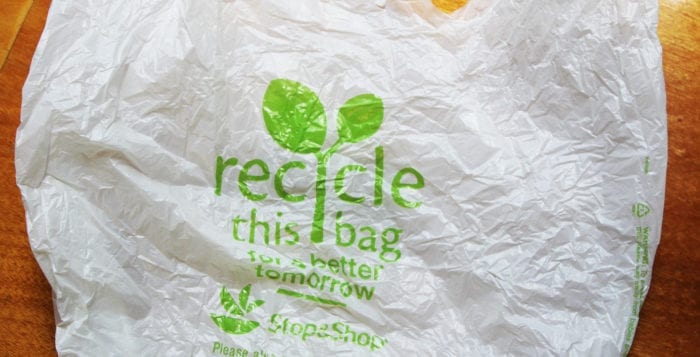Plastic bag fee looks to limit waste from LI shoppers
It’s official: bagging your groceries will cost you.
The Suffolk County Legislature approved a 5-cent fee per plastic grocery bag this month, which will be collected and kept by stores. The main goal of the legislation is to reduce bag waste by incentivizing shoppers to avoid the fee and bring their own bags.
“I feel relieved,” Suffolk County Legislator William “Doc” Spencer (D-Centerport) said in a phone interview. “But I am also concerned.”
Spencer said he is “sensitive” to struggling families with the current cost of living, and doesn’t want them to feel like this is a new fee or tax being imposed on them.
“This is nothing new, people are paying for these bags already,” he said.
“Plastic bags are a mistake of the past. Reusable bags are the solution for the future.” —Adrienne Esposito
According to the legislator, grocery stores already work the price of the plastic bags they give away into the price of products they sell.
A report conducted by the Metropolitan Washington Council of Governments about plastic bags stated consumers pay $37.50 per year in hidden bag costs passed on by retailers.
But some residents are not on board with the future fee. Suffolk County Legislator Sara Anker (D-Mount Sinai) said she heard many responses from senior citizens in her district that they don’t like the new bill.
“I had an overwhelming response from residents not supporting the fee,” she said in a phone interview. “To [the senior community] it’s just another expense. The 5 cents goes right back to the retailer, and it should really go to a designated environmental fund.”
The idea of the fee going to an environmental cause was first implemented in Washington D.C., the first place in the United States to impose a 5-cent fee on plastic bags, with the Anacostia River Cleanup and Protection Act. According to the legislation, only 1 out of the 5-cent fee is collected by the store, and the rest is deposited in the Anacostia River Cleanup and Protection Fund.
In a 2013 study of the D.C. law, researchers found that both residents and businesses reported a significant reduction in disposable bag use and a majority of residents and businesses supported the bag fee. In addition, both residents and businesses said they saw fewer plastic bags littering the area.
Spencer said creating legislation similar to that in D.C. was discussed, with part of the fee going toward an environmental cause, however it ended up being out of his control.
“I would love to do that, but we don’t have the taxing authority,” Spencer said. He explained it would require state action for part of the fee to be divided and sent to an organization.
“I would love to see that money go towards conservation,” he said. “But it is important to move forward now and not wait for the state to act. On a county level, we’ve taken the lead.”
Spencer said he hopes eventually the state will create legislation that will supersede his own, but for now he must continue to do his job.
Citizens Campaign for the Environment Executive Director Adrienne Esposito applauded Spencer’s legislation.
“Plastic bags are a mistake of the past,” she said in a statement. “Reusable bags are the solution for the future. This legislation will reduce plastic bag use by 60 percent or more and that will make our communities and our bays cleaner and greener, and save us money. Kudos to Suffolk County Legislator Doc Spencer for his leadership and persistence in protecting our environment.”
The CCE said there is more plastic in the oceans than plankton, with 46,000 pieces of plastic in every square mile. Many marine animals are choked and strangled by bags, or die consuming them. The CCE said plastic pollution negatively impacts 267 species of marine life.
John Durso, president of Local 228, a retail labor union and Long Island Federation of Labor, said the bill will introduce positive change to Suffolk County. “The Suffolk County plastic bag law is truly an innovative bill that takes great steps to cut back on environmental waste, while also addressing the needs of local workers and businesses,” he said in a statement. “We were glad to work with the Suffolk County Legislature to collaborate on a landmark legislation that will protect our environment for future generations of Suffolk County’s working families.”
The fee will go into effect Jan. 1, 2018.







